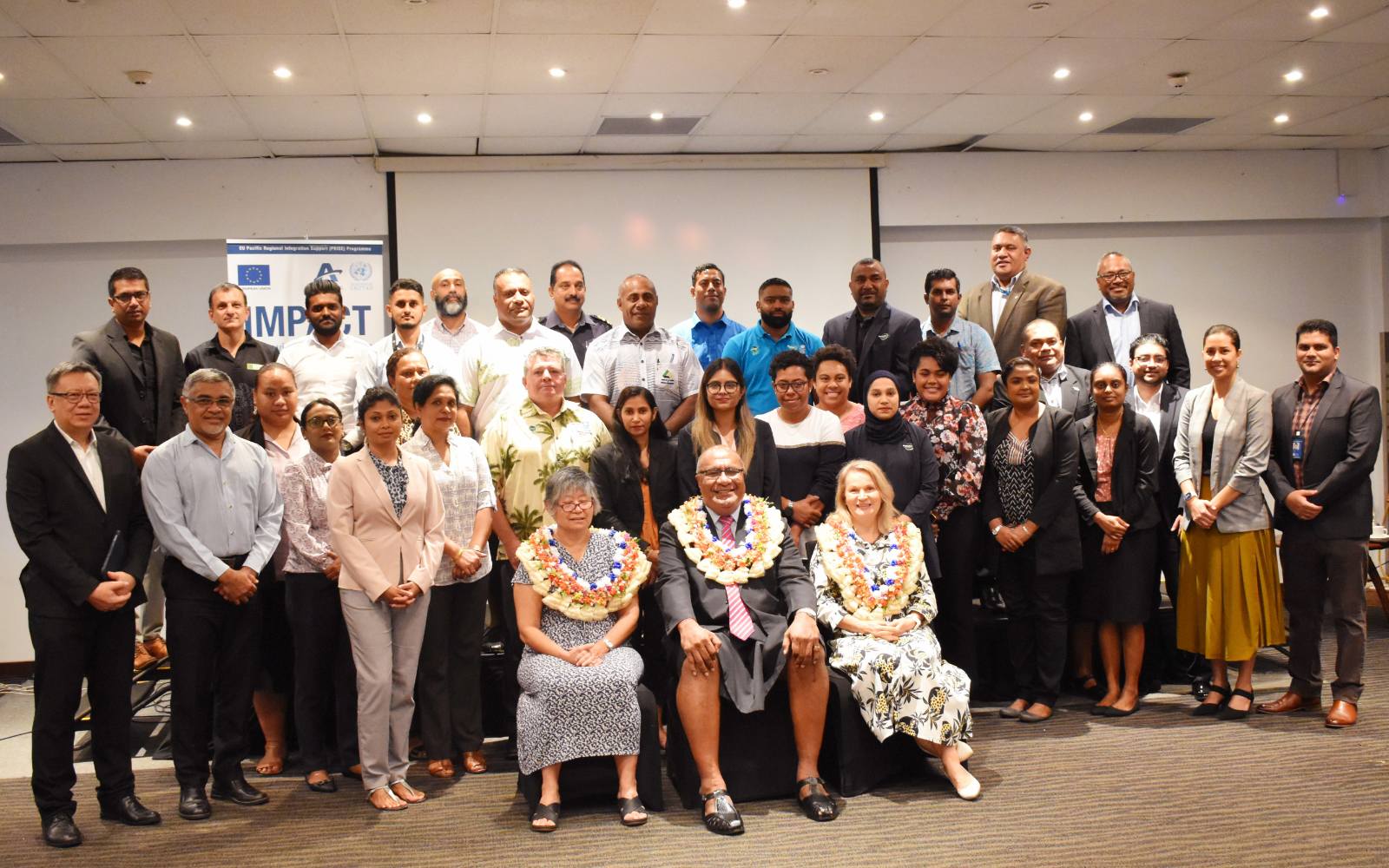Ms Andie Fong Toy, UN Resident Coordinator, a.i. (Ad interim) officer in charge,
H.E Dr Erja ASKOLA, Deputy Head of EU Delegation,
Mr Jayvee SANTOS, UNCTAD Regional Coordinator,
Trade Facilitators,
Private Sector Partners,
Distinguished guests,
Ladies and Gentlemen,
Bula Vinaka and a very good morning.
I am delighted to address all of you today, as we come together to provide feedback on the Single Window Blueprint Report, developed by the United Nations Conference on Trade and Development (UNCTAD).
Let me say that these initiatives fall well into Governments intentions to transition Fiji to a fully digitised economy. So the Government of Fiji fully supports this initiative.
Before us lies an extraordinary opportunity to reshape the way we conduct international trade, and the Single Window Blueprint Report serves as our compass in this transformative journey.
Ladies and Gentlemen,
Fiji ratified the World Trade Organization’s Trade Facilitation Agreement (TFA) in 2017. It aims to simplify and harmonise customs procedures, enhance transparency, and promote cooperation among nations.
Within this agreement, the Single Window component, envisions a digital platform that integrates all trade-related activities and documentation into a single, streamlined interface. It allows traders to submit their documents, declarations, and clearances electronically, reducing the time and effort required for cross-border transactions.
Ladies and Gentlemen,
Today, I would like to highlight a few practical examples of the tangible benefits we can expect from the implementation of a single window.
First and foremost, let us consider the perspective of our traders. By implementing a single window, we can save valuable time and reduce administrative burdens for businesses engaged in international trade.
Currently, traders are required to submit redundant paperwork to multiple government agencies, resulting in duplication of effort and delays. With a single window, traders will have a unified platform through which they can submit all necessary trade-related documents. Imagine the relief our exporters will experience when they can navigate trade procedures seamlessly, unlocking new avenues for growth and market expansion.
Now let us turn our attention to the benefits the government stands to gain from the implementation of a single window system. Currently, each agency operates in its own silo, leading to fragmented processes and information gaps.
One of the most significant advantages lies in the improved coordination and collaboration among various government agencies involved in trade facilitation. Not only enhancing operational efficiency, but a single window also enables better risk assessment, improved revenue collection, and strengthened border security. By breaking down silos and fostering interagency cooperation, the government can optimise resources and deliver services more effectively.
Ladies and Gentlemen,
To successfully implement the single window in Fiji, we may well need to undertake a series of strategic measures:
- Firstly, we will have to establish a dedicated national single window agency that will serve as the central coordinating body responsible for overseeing the development, implementation, and maintenance of the system;
- We will also need to develop robust legal and regulatory frameworks to support the national single window system. This will involve reviewing and amending existing laws, regulations, and procedures;
- capacity-building programmes will be required to equip our officials and private sector with the skills and expertise necessary to implement and utilise the system; and
- Prioritising public awareness and stakeholder engagement to ensure a smooth transition to the national single window system.
Several advanced economies have adopted single window and have benefited from it.
For example, Singapore is known for its efficient trade facilitation measures. It introduced its single window system, TradeNet, back in 1989. It integrates 35 government agencies.
According to the World Bank, after Singapore implemented the TradeNet, the processing time of a permit reduced from 7 days to 1 minute or less. Fees and charges reduced from US$13 to US$2.10, and the number of documents required, reduced from 20 documents to 1 electronic form.
While we are starting later, we have the unique opportunity to draw inspiration from and learn from such experiences and tailor our approach to suit Fiji’s context.
Ladies and Gentlemen,
The Fiji Government does not take on initiatives in isolation and without a coordinated plan to improve our cross-border trade. Agencies such as Fiji Revenue and Custom Services, Biosecurity Authority of Fiji, Ministry of Health and Medical Services and Fiji Ports Terminal Ltd, are an integral part of this initiative.
We envision a business-friendly environment in Fiji, where the time and cost of doing business are minimised, and our businesses and exporters are fully supported.
Last month, in Detroit, we concluded negotiations on Strengthening our Supply Chains (Pillar II) in the Indo-Pacific Agreement Framework (IPEF) for Prosperity. The IPEF includes not only some of the major trading partners of Fiji, like the US, Australia and New Zealand, but also some of the major trading powerhouses of the world like Japan, Korea and ASEAN economies.
The IPEF Supply Chain Agreement is highly relevant to what we are trying to achieve through the creation of single window. This demonstrates that the Fiji Government is committed to strengthening our trade both nationally, at a regional and multilateral level.
In line with our commitment to digital transformation, Fiji has also made significant strides in the digitalisation space. We recognise that harnessing technology is not just a short-term solution but a long-term imperative. Our efforts to embrace digital solutions have already yielded positive outcomes. However, we cannot rest on our laurels. We must continue to explore new avenues to remain competitive in the global arena.
Ladies and Gentlemen,
The validation process we embark upon today represents an important milestone in our journey toward an efficient and modern trade ecosystem. Your insights and recommendations will shape the final blueprint and set the course for Fiji’s trade facilitation efforts.
On this note, I would like to extend our sincere gratitude to the European Union, for their generous support in this endeavour. I also extend my heartfelt gratitude to UNCTAD for their invaluable support and expertise in preparing this blueprint report.
As we move forward, we request for continued assistance from our development partners to ensure the successful implementation of this initiative.
Ladies and Gentlemen,
Let us seize this opportunity to collectively chart our path forward and build an ecosystem where trade flows smoothly and businesses thrive.
I wish you all fruitful deliberations ahead.
Thank you. Vinaka vakalevu.



